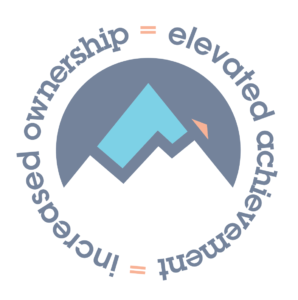Share this article.
Hello, Students!
We’re Elevated Achievement, a group of educators dedicated to helping schools, teachers, parents, and caregivers, and you, the students. We exist because we believe that each and every person deserves to own their learning each and every day and in each and every lesson.
What does this mean? It means that we believe that true success in learning requires students to go beyond just doing or understanding school—you must own your learning. A student who owns their learning knows and can tell others:
- What they are learning, why they are learning it, and how they will use it.
- How they learn best.
- When they are learning and how to get help when they are struggling.
- Their role as a learner in any setting.
When you know this information and you can tell others, you will learn more. You will be learning at higher level. You will get smarter. You will be elevating your achievement. Do you want to know how? Keep reading.
Why Owning Your Learning Matters
A very smart and very successful educator named John Hattie showed us through his research that students who own their learning are more motivated to learn and those students who are more motivated to learn actually learn more. He said, “…it is the students themselves, in the end, not teachers, who decide what students will learn.” (2009)
In other words, you, the student, have the power to learn and you have the power to decide how successful you will be.
Because of this power, it is important that you understand that learning is more than completing assignments your teachers give you or answering questions in class or on tests. Learning—deep learning, learning that no one can take away from you—involves metacognition. Nancy L. Chick, a researcher and a Scholarship of Teaching and Learning scholar, describes metacognition and its importance in this way:
“Metacognition is, put simply, thinking about one’s thinking. More precisely, it refers to the processes used to plan, monitor, and assess one’s understanding and performance. Metacognition includes a critical awareness of a) one’s thinking and learning and b) oneself as a thinker and learner…
Metacognitive practices help students become aware of their strengths and weaknesses as learners, writers, readers, test-takers, group members, etc. A key element is recognizing the limit of one’s knowledge or ability and then figuring out how to expand that knowledge or extend the ability.”
In other words, you, the student, can be a metacognitive learner by learning about how you learn. You can practice this by intentionally thinking about and reflecting upon your learning each and every time you learn something new. When you do this, you will own your learning and elevate your academic achievement.
How do you do this? Develop a reflection routine that you use at the end of every assignment, every lesson, every learning experience. Here’s how…
How to Reflect on Your Learning
As we said before, true learning happens when you own your learning. Use this Own It! Guide and Reflecting on My Learning chart to create a reflection routine that works for you after each learning experience.
A final note: There are no right or wrong answers. This is your reflection routine. It’s your tool to help you be a metacognitive learner. It’s your learning that you will own. But, it is more fun if you don’t do it alone. So build a community that you can talk to about your learning. Talk to classmates. Talk to your family. Talk to your teachers. The more you do the more you will learn about yourself and your learning.
Elevated Achievement is here to help you.
We have downloadable Resources for Students to support you as you increase ownership of your learning and elevate your achievement. Check them out. Share them with your friends.
The Learning Brief
In this article students learned…
- What it means to own their learning and why it matters.
- Why it’s important to be a metacognitive learner.
- How to develop metacognition by reflecting on their learning.
Can you imagine building an environment full of motivated, engaged, and eager students who own their learning?
We can.




